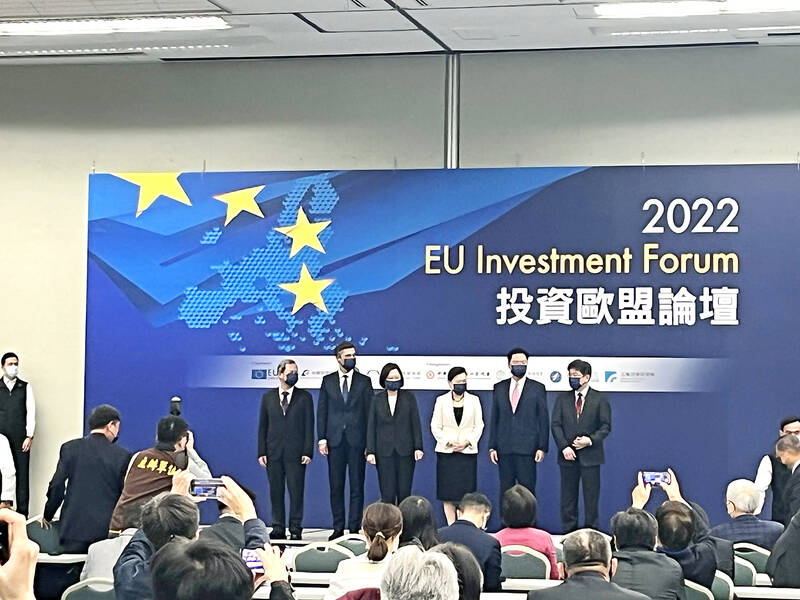Government officials on Tuesday touted Taiwan’s leading position in the chip sector, while appealing to the EU to start talks for a trade deal, which Taipei has long sought.
“The restructuring of global supply chains and transformation of our economies bring enormous potential for closer, mutually beneficial cooperation between Taiwan and the EU,” President Tsai Ing-wen (蔡英文) said at an EU investment forum in Taipei.
“I am optimistic that this will help pave the way for negotiation of [a] bilateral investment agreement,” she said of the forum.

Photo: Liao Chia-ning, Taipei Times
Although it is Taiwan’s largest source of foreign investment, the EU and its member states do not have formal diplomatic ties with Taiwan.
The EU has been courting Taiwan, a major semiconductor producer, as one of the “like-minded” partners it would like to work with under the European Chips Act unveiled in February.
In the wake of a global chip shortage, during which Germany had asked Taiwan to help ease a shortage of auto chips, countries around the world have announced massive investments to boost domestic chip production and research.
“Top priorities now for nations are engaging in cooperation with like-minded allies, building secure and reliable supply chain partnerships and avoiding over-reliance on a single market,” Minister of Economic Affairs Wang Mei-hua (王美花) told the forum.
With the EU planning to set up at least 6 million public charging stations for electric vehicles (EVs) by 2030 and electric vehicles requiring significantly more chips than conventional vehicles, “Taiwan will be a trustworthy partner for the EU in developing its EV market,” Wang said.
As the restructuring of the global supply chain accelerates, in the coming years, “Taiwan investment in the EU will far surpass the amount now, especially in semiconductors,” National Development Council Minister Kung Ming-hsin (龔明鑫) said.
Given the enormous amounts of investment between Taiwan and the EU, Kung asked: “Can we start to discuss a bilateral investment agreement?”
The EU included Taiwan on its list of trade partners for a potential bilateral investment agreement in 2015, the year before Tsai became president, but it has not held talks with Taiwan on the issue since.
“Bilateral trade investment cooperation has never been more important, with unprecedented environmental and geopolitical challenges seriously testing our shared resilience,” Tsai said.

The US dollar was trading at NT$29.7 at 10am today on the Taipei Foreign Exchange, as the New Taiwan dollar gained NT$1.364 from the previous close last week. The NT dollar continued to rise today, after surging 3.07 percent on Friday. After opening at NT$30.91, the NT dollar gained more than NT$1 in just 15 minutes, briefly passing the NT$30 mark. Before the US Department of the Treasury's semi-annual currency report came out, expectations that the NT dollar would keep rising were already building. The NT dollar on Friday closed at NT$31.064, up by NT$0.953 — a 3.07 percent single-day gain. Today,

‘SHORT TERM’: The local currency would likely remain strong in the near term, driven by anticipated US trade pressure, capital inflows and expectations of a US Fed rate cut The US dollar is expected to fall below NT$30 in the near term, as traders anticipate increased pressure from Washington for Taiwan to allow the New Taiwan dollar to appreciate, Cathay United Bank (國泰世華銀行) chief economist Lin Chi-chao (林啟超) said. Following a sharp drop in the greenback against the NT dollar on Friday, Lin told the Central News Agency that the local currency is likely to remain strong in the short term, driven in part by market psychology surrounding anticipated US policy pressure. On Friday, the US dollar fell NT$0.953, or 3.07 percent, closing at NT$31.064 — its lowest level since Jan.

The New Taiwan dollar and Taiwanese stocks surged on signs that trade tensions between the world’s top two economies might start easing and as US tech earnings boosted the outlook of the nation’s semiconductor exports. The NT dollar strengthened as much as 3.8 percent versus the US dollar to 30.815, the biggest intraday gain since January 2011, closing at NT$31.064. The benchmark TAIEX jumped 2.73 percent to outperform the region’s equity gauges. Outlook for global trade improved after China said it is assessing possible trade talks with the US, providing a boost for the nation’s currency and shares. As the NT dollar

The Financial Supervisory Commission (FSC) yesterday met with some of the nation’s largest insurance companies as a skyrocketing New Taiwan dollar piles pressure on their hundreds of billions of dollars in US bond investments. The commission has asked some life insurance firms, among the biggest Asian holders of US debt, to discuss how the rapidly strengthening NT dollar has impacted their operations, people familiar with the matter said. The meeting took place as the NT dollar jumped as much as 5 percent yesterday, its biggest intraday gain in more than three decades. The local currency surged as exporters rushed to